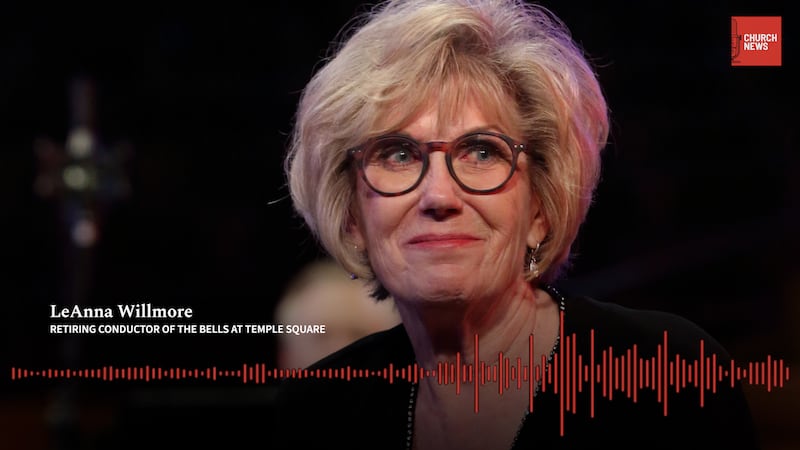The welcoming sound of bells has heralded celebration and worship for centuries of Christian worshippers. This includes the music of The Tabernacle Choir at Temple Square since its pioneering start in 1847. In 2005, the inclusion of a handbell ensemble was officially organized under the auspices of the choir; the handbell group has evolved to 32 musicians who enhance choir concerts and recordings, as well as perform two handbell concerts each year.
From its inception, LeAnna Willmore served as associate conductor until she was named director in June 2011, until her final concert in June 2024. Willmore holds a Master of Music degree from the University of Utah, has served in many state and national music leadership positions, and, importantly, fostered a love for music as a choir teacher for decades of students across Utah’s Wasatch Front. She joins this episode of the Church News podcast to discuss the importance of music in worship and daily life.
Listen to the Church News podcast on Apple Podcasts, Amazon, Spotify, YouTube or wherever you get podcasts.
Transcript:
LeAnna Willmore: Can you imagine Sunday without the organ playing? Without the hymns? When I was teaching and when I am with the Bells, I could be feeling not very good, but as soon as I’m in front of that choir, everything’s forgotten. I’m just there with that choir, making music and loving it. And the ringers have told me that they feel that way too. And I know that I’m not alone in this. I figured out really soon that I wasn’t choosing that music alone. Even the things that I say in the rehearsal, that has come from something higher, from something divine. It has helped me get through difficult times. I’m just in seventh heaven making music.
1:11
Sarah Jane Weaver: This is Sarah Jane Weaver, executive editor of the Church News, welcoming you to the Church News podcast. We are taking you on a journey of connection as we discuss news and events of The Church of Jesus Christ of Latter-day Saints.
The welcoming sound of bells has heralded celebration and worship for centuries of Christian worshippers. This of course includes the music of The Tabernacle Choir at Temple Square since its pioneering start in 1847. In 2005, the inclusion of a handbell choir was officially organized under the auspice of the choir, which has evolved to 32 musicians who enhance choir concerts and recordings as well as perform two handbell concerts in the Tabernacle each year.
From its inception, LeAnna Willmore served as associate conductor until she was named director in June 2011. Willmore holds a Master of Music degree from the University of Utah and has served in many state and national leadership positions and importantly fostered a love for music as a choir teacher for decades of students living on the Wasatch Front in Utah. She joins this episode of the Church News podcast to discuss the importance of music in worship and in daily life. LeAnna, welcome to the Church News podcast.
LeAnna Willmore: Thank you. It’s nice to be here today.
2:34
Sarah Jane Weaver: Well, we’re thrilled to have you. And I hope we can start and just have you describe what the Bells at Temple Square are. And then I want to talk a little bit about the organization’s mission.
2:46
LeAnna Willmore: The Bells are a group of — we change numbers — sometimes we have 30, and sometimes we have 35, depending on who has been released. And we are a group of bell ringers. These bell ringers play music that would be like the music of an entire orchestra. We play the range of an orchestra, from the tubas to the piccolos, and play all of the parts. The only thing is we don’t have the different timbres. We don’t have the different sounds. Everything we do is on bells and on chimes. And our job is to make that music sound like a beautiful orchestra.
We have different things, different techniques we can do with the bells. We can bump them on the table, which is called martellato. We can put our thumb on the bell and make it sound short. We can pluck the bell and make it sound staccato. So we can add a lot of different techniques to it. We can use mallets on these bells and create all kinds of sounds that are percussive sounds, but we can’t play the flute sound or the tuba sound. And we don’t have words. So our task in bringing this beautiful music to people is to put in the phrasing, the louds and the softs, the emotion into the music so people will enjoy it and feel the Spirit without having the words.
4:29
Sarah Jane Weaver: Well, and I will have my producer, KellieAnn, add some of the Bells’ music into this podcast so that our listeners can actually hear how magical it is.
[A recording of the Bells at Temple Square and Orchestra at Temple Square performing “Simple Gifts,” arranged by D. Linda McKechnie.]
4:58
Sarah Jane Weaver: Tell me how you become a bell ringer. Do people grow up thinking, “I want to be in a bell choir”?
LeAnna Willmore: Probably not. But more and more our young people are hearing bells. We have, I’m going to guess, but about 30 bell choirs functioning in the high schools and junior high schools in Utah. So they have classes. And some of those young people that came through those bell choirs are now in the Bells at Temple Square. We have community choirs that play beautifully. And they have a lot of people that are studying ringing bells, and some of them have ended up in Bells at Temple Square. So there’s a lot more to do with bells than there used to be.
I would guess that someone growing up and saying, “I want to play a bell or be in a bell choir” is probably somebody who has a parent in a bell choir, who has been watching their parents on the stage for all of their life or coming to our concerts. So there’s a little bit of that. So, it’s changed in the 20 years that we’ve been going.
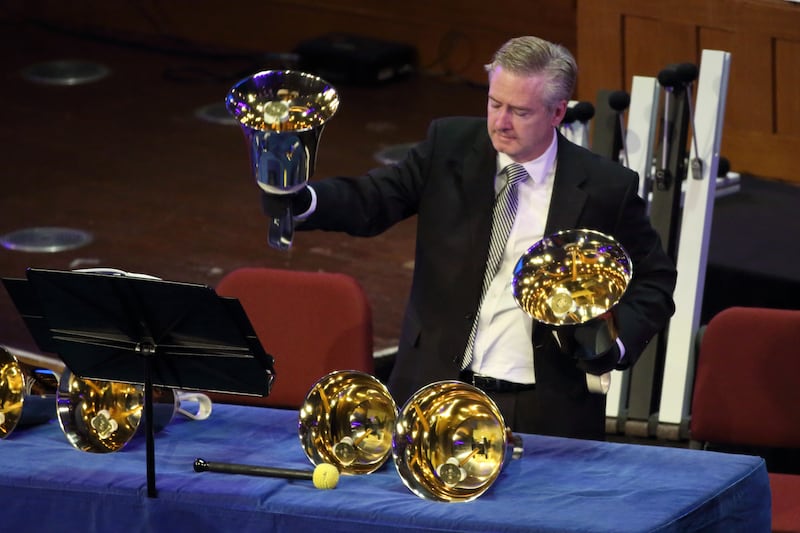
6:16
Sarah Jane Weaver: Well, I have three daughters. One of my daughters played in a percussion ensemble that actually included bells, and it was fun to watch that sort of take place. It is an interesting art.
So, let’s talk about the organization’s mission. It would have a similar mission to the Tabernacle Choir, which would be to serve an audience through the music that you share.
6:41
LeAnna Willmore: It is the same, in that way — to inspire them, to make them feel. We try to emote, smile, as we’re playing, and bring the Spirit to the performance, and hopefully the audience will feel that. Many of our tunes that we play are familiar tunes. Some of them are not. But all of it is chosen, either to make them smile and laugh or to feel the sacred and to feel the divine. So that is our mission; it’s the same.
It’s a little bit different with us — the choir, our mission is “throughout the world,” and we haven’t had a chance to travel throughout the world, but we are on YouTube, and we livestream our concerts. So, many people from other countries write in on the chat that they’ve watched us. So we are getting some presence there. We’ve traveled ourselves to Anaheim and Texas and performed, but we haven’t been to Mexico. So we’re hoping that sometime those chances are going to come for us too. We don’t travel with the choir; they would not be able to take our equipment. Our equipment is hauled for us when we perform by an 18-wheeler, and there wouldn’t be adequate place to even put us in another country.
But you’ll see some bells with the choir, but they are the choir singers themselves. And I have worked with them and trained them, and then they just play a few simple things. And just those few simple things bring out so much joy and light in the concert. It was fun to watch the choir in Mexico. They were in the very first number, and the first thing I heard from the announcer was, “Look at the bells.” So everyone else got really excited about that.
8:43
Sarah Jane Weaver: Well, how much does a bell weigh? If someone’s in a concert holding a bell in each hand, is that a physical workout?
LeAnna Willmore: Yes, but it depends on the size of the bell. We have some little tiny bells that just weigh a few ounces. So ringers can play two in each hand or three in each hand with those of different pitches. And then there are these great big bells that weigh 11-12 pounds. And usually they don’t do one in each hand. They usually use two hands to do that one bell, but you will see some of our hefty guys pick one up in each hand and ring them, but our women have to play mallets on those. It’s a little hard for us to lift them.
9:31
Sarah Jane Weaver: So, the bigger the bell, the lower the tone. Is that correct?
LeAnna Willmore: Yes.
Sarah Jane Weaver: And as the bell gets smaller, then you’re into higher pitches.
LeAnna Willmore: Yes.
Sarah Jane Weaver: That is remarkable. Well, tell us some of your highlights from your time with the Bells.
9:46
LeAnna Willmore: My personal highlight is the rehearsals. That’s where we learn the music, that’s where we have the fun, that’s where we laugh and enjoy each other as we’re learning. So that’s the most favorite. There’s other highlights, but it’s interesting; it’s usually not the performance. You work and work and work for the performance, and it lasts an hour or an hour and a half, and it’s done. But the rehearsals have been going on for that performance for five months, every Wednesday, and sometimes Wednesday and Saturday. It takes a long time to learn bell music, the level that we play, because we play at the highest level. And I enjoy the concert. It’s a lot of fun when it’s happening. But really, the networking, the love of the ringers, all of the feelings that you have take place in the rehearsal.
10:45
Sarah Jane Weaver: I have a set of amateur bells at my house, and we pass them out at Christmas. And we are very far from making music with them. It’s an ordeal, and sometimes you can almost get a melody. But I suspect that you have learned that there is power in unity and power in working together and power in the collective, because individually, these bells wouldn’t mean much.
11:12
LeAnna Willmore: No, if you use the piano keyboard as an example, each ringer has two white keys, and then the black keys that go with them, the flats and sharps that go with them. So if you just play ding ding, on the C and D, that’s not a melody. So you have to have all of the people next to you on both sides, and we set up in scale order. You would have to have everybody to make that scale. As you get into the higher, smaller bells — and they can hold so many more bells — they can add more to it. But the lower bells only have those two white notes.
And they have to be master counters. Sometimes they will have out of four 16th notes — everybody that’s listening knows what a 16th note is, surely — and they would play one of those. And they’re quick. So, just grabbing your 16th note in the right time so there’s no break on either side of it and it sounds like one person is playing it. So it’s a masterful art. These ringers that we have, they’re at the top of their game.
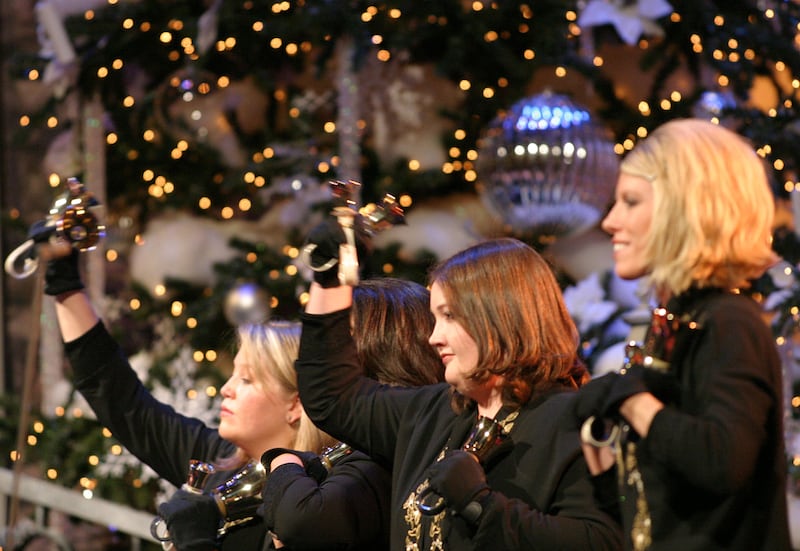
12:29
Sarah Jane Weaver: That sounds incredible. How are the Bells different from other church musical groups?
LeAnna Willmore: We play much more difficult music. If you have, usually, another church group, they would have probably people that are a lot older in a group. Our ringers can only go to age 50, and then they have to retire. And the age limit is set because of the physical need that they have for the difficulty of our music. And so you have bell ringers in other churches that can play forever. Before we even take someone in, they have to be already a master musician before they even get in the group. They have to have either played a percussion instrument or piano, something where they’ve had to count. And most often, people have played bells when they come into our group already. So they are on their way.
13:36
Sarah Jane Weaver: Well, and we hear a lot about this intensive audition process for The Tabernacle Choir and Orchestra at Temple Square. Do you also have a pretty intensive audition process where you’re not only showing, “Hey, I can count, I can play the bells,” but, “I know something about music theory,” etc.?
13:57
LeAnna Willmore: OK, we don’t do music theory. We have pretty intensive auditions, but they apply and give their resume of what they’ve done in music. I look that resume over, and if they haven’t had experience already in playing in an ensemble and playing a musical instrument, if they haven’t had that pretty intensive and years of study, they don’t get invited for an audition.
So, I invite those that have had experience. They come to the audition, and we have three Saturdays and have our bell ringers come and teach them actual workshop classes, teach them how to ring, how to hold the bells, just things to do. Even if they’ve played bells, we teach them our way. And then they ring with us for three Saturdays while we watch them, while the leadership watches them. And then I take turns having different bell ringers watch them, and they have to be able to smile. Now, that’s really hard when you’re auditioning. And I say, “I need to see your TV face.”
Sarah Jane Weaver: Well, that is important. You want people to know this is joyful.
LeAnna Willmore: Yes, it is. You don’t want sour faces, and to bring the Spirit, you can’t do that.
15:24
Sarah Jane Weaver: What is it about music that has an ability to touch people? It seems to communicate to hearts.
LeAnna Willmore: It does. It’s tones and harmonies and rhythms that come together and speak in a universal language. And I know that’s cliche — we say that all the time — but it is. You can listen to a piece of music that is in another language, and you don’t understand the words at all, and you can still be moved by the music. So it is something that speaks to all of us in any language.
16:00
Sarah Jane Weaver: Do you have a favorite song that you have conducted on the Bells?
LeAnna Willmore: Oh, well, there’s a lot of them, but probably my favorite is going to be in this next concert. It’s called “Expedition.”
16:15
[A recording of the Bells at Temple Square performing “Expedition” by Joel Raney.]
16:30
LeAnna Willmore: And it’s this wonderfully difficult song that uses all the techniques, and written by a person that works with bells all the time, Joel Raney, and he wrote this song, and every one of the ringers just love it. And this is not the first time we’ve done it. This is the second time we’ve done it. And I thought it had to be in my final concert. It’s just beautiful. It’s wonderful. It’s exciting. It’s long. It has all kinds of mixed meters, so 7/8 time and 4/8 time, it just goes back and forth. It uses the chimes and the bells. It has fast, difficult rhythms. And it’s really showy.
17:13
Sarah Jane Weaver: Since you mentioned that the next concert will be your final concert, I want to talk about it. After a long career, you’re coming up on retirement, I’m sure that has a lot of emotions. How did you first get involved with music?
17:30
LeAnna Willmore: Well, my parents bought a piano, and I was 7 years old. They brought it into the house, and I can still remember them bringing it into the house. I fell in love with that piano. I couldn’t wait to take piano lessons. And I did, and I just took off on piano. And as soon as my mother realized that I was not practicing because I could already play the pieces I was given, she would just keep changing teachers, until by the time I was 12, I finally got a teacher that was difficult enough, gave me difficult enough music that it would challenge me.
And I played all through elementary school, I played for all of the classes and played for other teachers and their classes. And then I got into junior high, and I accompanied all the choirs, and I had a teacher that missed a lot in choir, and I actually taught the choir and played for the choir. And someplace in there, I thought, “I probably ought to go into music. I probably ought to be a choir director.”
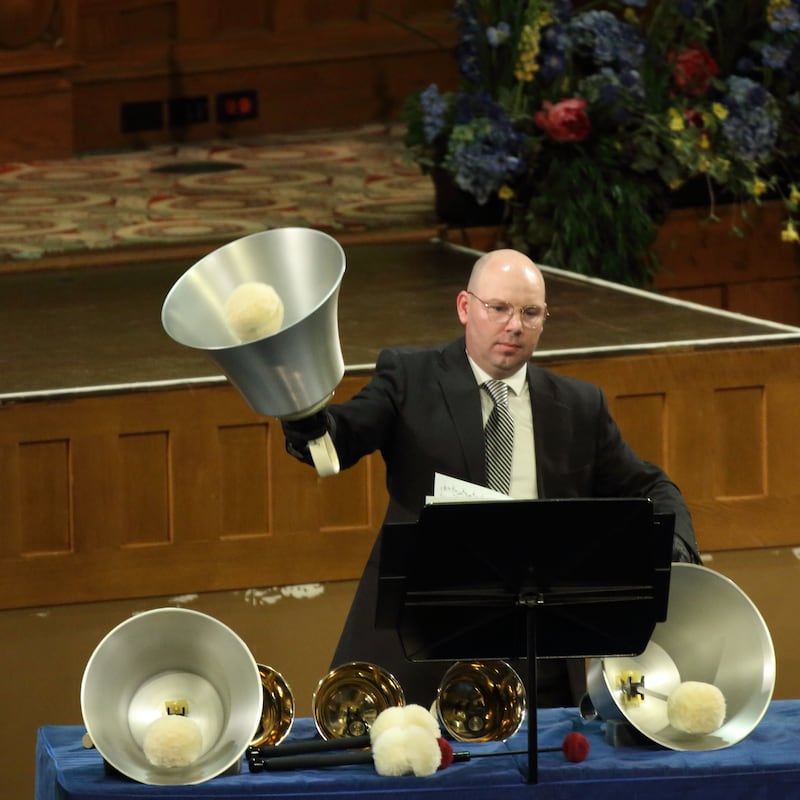
18:36
Sarah Jane Weaver: Well, you’re a mother’s dream, I just have to say, after trying to get three daughters through piano lessons, to have someone who actually wants to do it. But then you did study piano, or was it music, in college and graduate school?
18:54
LeAnna Willmore: Both. I went to Weber State first, and they had, at that time, they don’t have that anymore, but they had music education with a piano emphasis. So I was able to play piano and give a piano recital for my final capstone. And then I started teaching in Weber County. Then I moved to Jordan district for 19 years, and I just loved those students. I thought there was nothing like a high school student. I still feel that way.
19:28
Sarah Jane Weaver: So, in addition to making music with the Bells, you have also had the opportunity to influence generations of high school students and teach them to love music through choir. What is it like to help someone so young in their life learn to understand that music can be something that is a lifelong endeavor?
19:51
LeAnna Willmore: The music helps them see that. It’s really interesting how you can pick the right songs that have the right message, and they’re in the class singing it, and they feel it. I would see lives changed for the better all the time. And in concerts, they would cry when they would sing the words because the emotions were so high, the music was so powerful and just rang to their soul, a wonderful, wonderful thing. And the important thing is the music that you choose. I was always very prayerful about my music, as I am now with the Bells at Temple Square. It has to be right. It has to be right for the occasion, but it has to be right for the people that are performing it so that they can grow.
20:45
Sarah Jane Weaver: Well, I think that is actually beautiful. We have one daughter who was going through some hard things in high school when she joined the choir. And to this day, she is now a returned missionary at BYU and still sees those friends every week because it felt like good kids are drawn to music.
21:08
LeAnna Willmore: They are. I’m glad you said that, because that’s the way that the bell ringers are; they are such close friends. They are not in a large group. There’s 32 of them. They carpool together. They are the best of friends. They help each other through all their difficulties. And it’s been such a joy for me because I’ve been like their mother, in a way. I know when they’re going to have a baby before their family does, because they have to tell me that they have to have time off. It’s just a really close association. And I wouldn’t give that up for the world, all that experience.
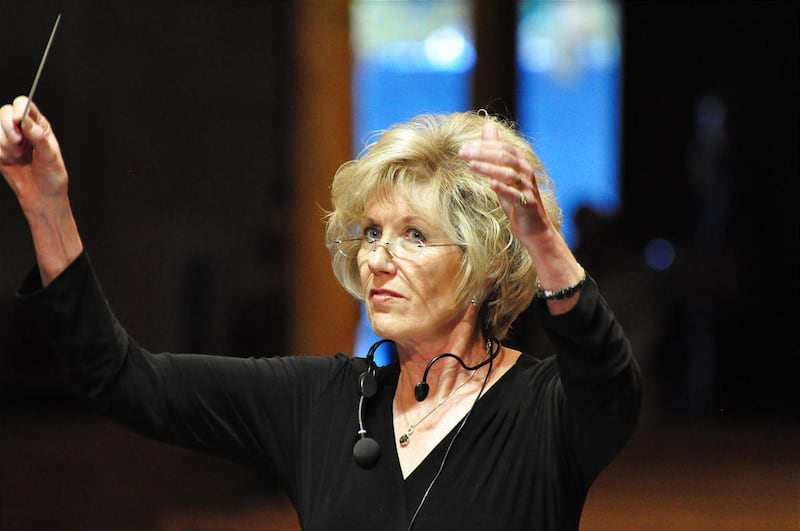
21:50
Sarah Jane Weaver: How has music blessed your personal life, yourself and your family?
LeAnna Willmore: Well, I have to laugh because my husband said he thought when we got married that we would just be playing the piano all the time and singing around the piano, which is not so. It’s very interesting because when I would come home from school or doing Bells, I don’t go to the piano and play. I’ve had enough music. That’s kind of funny, but I don’t listen to music in the car; I listen to books. I’m quite saturated with music. So it’s affected me that way. But I made sure that both my children had lessons. And my first son played the piano. He was blind, he’s passed on now, but he played the piano, and a beautiful singer. My second son plays the French horn and got a scholarship and used his music. And of course, at Christmastime we sit around the piano and sing.
22:54
Sarah Jane Weaver: Well, I have to tell you, as a writer, I understand what you’re saying. People say to me, “I bet you have the most amazing journals.” And it’s hard to write in a journal when you’ve been writing and editing all day. It really is, sometimes when your passion becomes your work, it’s hard for it to again become something that is so joyful. But we both are lucky enough to have our passion be our work.
23:24
LeAnna Willmore: Yeah. I feel so lucky with that, and it has changed my life. I wouldn’t be the same person if I didn’t have it. I’m grateful every day for music in my life, and I don’t ever get away from it. I play the organ at church, I teach piano lessons. It’s just part of my life, and I love it. It’s a wonderful thing to see people moved through music. I have loved getting — not a lot of letters, but we’ve received some letters of people who’ve been in the audience and who have been interested in the Church because they’ve been to our concert. That just thrills us. But not just that, but feeling the emotion. I love reading the chats when we have a livestream and reading what they say about the music and the bells and how it moves them. Those kinds of things fill me.
24:19
Sarah Jane Weaver: In the course of your career, certainly you would have seen the way music is shared take different forms. You start early in your career, if people want to hear your music, they probably had to come to a concert. Or maybe they could have gotten it on a cassette or a CD. And now music is so accessible because you can livestream. You could even do live concerts, I’m sure, through social media.
24:48
LeAnna Willmore: Oh, it’s changed a lot just in this 20 years. And when we started, one of the main things we wanted to do was get a DVD of the Bells at Temple Square. We thought that would be the thing that would promote us the most, right at the time when DVDs were going out. And Scott Barrick was there with the choir at the time, and he just said, “We could never sell enough of those DVDs to get back the money we put into it.” And he said, “I think you should do YouTube.” And thank heaven for him.
We put our first YouTube video out of “Flight of the Bumblebee,” and it had millions of views. I’ve lost track; so many. It’ll be our last song in the concert because it was our first YouTube success. And people just knew who we were from then on. It helped promote the Bells at Temple Square. So any place, any conference, I go to, everybody knows the Bells at Temple Square now. We’re out there.
25:57
Sarah Jane Weaver: We have a mutual friend named Scott Barrick who was over marketing and communication for the choir for many years and is now president of the historic sites at Kirtland. And so he’s probably very, very busy as the Kirtland Temple has now become an official Church historic site. But we can also take this opportunity and let our listeners hear “Flight of the Bumblebee.” That is probably one of those songs that is not easy to perform on the bells.
26:24
LeAnna Willmore: Oh, I looked it up to see if you could still buy it, and you can’t. I’m sure they don’t sell the music because it’s a Level 6, and nobody can play it. But we have it, and we have to change our whole position to play it. We can’t play in our normal position; we have to bring most of the ringers up on the front row so they are lined up and can play all the chromatics — I don’t know if that word means anything to our listeners, but that’s the half steps; it’s all the white and black keys in between they have to play. And it’s just so fun to watch, and it’s so fun to listen to.
27:02
[A recording of the Bells at Temple Square performing “Flight of the Bumblebee,” composed by Nikolai Rimsky-Korsakov and arranged by Martha Lynn Thompson.]
27:16
Sarah Jane Weaver: Well, that was so fun to listen to that music. It does actually help us all understand what you are trying to accomplish every week a little better and why it takes so much time and preparation.
27:28
LeAnna Willmore: Yes. It’s not like singing a song and singing all of the line, even the harmony. If you’re an alto, you start singing, you sing the whole line. If you’re the Bells, you just play one note or two notes in that line in the right place without a hole in between. So it sounds like one person is doing it. And I explained that before, but it’s just such a unique kind of a thing. One of the things that I’ve noticed with people that play bells — I noticed it in high school with my bell choir there and with the ringers — once you start ringing, it’s like it just grabs you and gets a hold of you. One of my students said to me, “Once you get your foot in the door, you can’t get it out.”
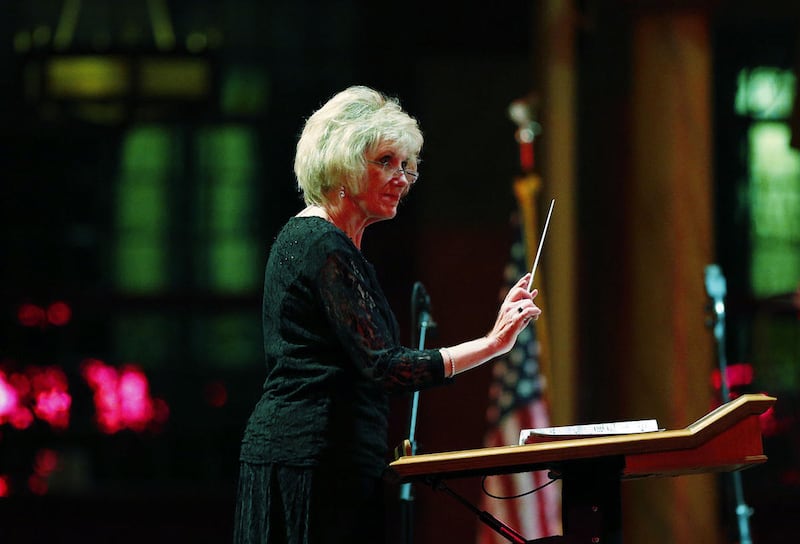
28:13
Sarah Jane Weaver: Wow. Now, I have seen the Bells perform mostly at The Tabernacle Choir and Orchestra at Temple Square’s Christmas concert, when they come down and stand in the aisles. I have never been to a Bells concert, although I’m now going to try and make it to the one in June because it sounds delightful. Tell us the difference between when you perform individually with the Bells and when the Bells support and contribute to the music of the Tabernacle Choir.
28:46
LeAnna Willmore: When we play with the Tabernacle Choir, we might come in at just the end, maybe the last 16 measures of the song, just to bring some light and excitement to the music that the choir is singing. And that music is written simply so that we can memorize it. And we just come down the aisles and play it from memory. It is hard to memorize bell music because you don’t play all the time, but we memorize all of the music that we play at Christmastime.
We play on several broadcasts like that and at Christmastime. But all the rest of the time, we play on tables and have our bells on tables with stands and play very difficult music, and the music we play looks like really difficult piano music. A pianist couldn’t play it. There’s too many notes. There’s as many notes as an orchestra would play. But it looks like piano music, and they pick their parts, their individual notes, out from that. They need to see all of the music so they know when to come in.
30:03
Sarah Jane Weaver: You conduct the Bells, but do you ever play the bells too? Do you ever pick up a bell?
30:09
LeAnna Willmore: Well, I played a lot when I taught high school, because there’d be someone missing, and I’d just go play their bells. And I taught them how to play. So I know how to play bells. But I couldn’t even begin to play like our top bell ringers — that two and three in a hand, playing six bells at once — I couldn’t do that. I haven’t developed that skill because I quit playing bells as soon as I quit teaching high school. And it’s amazing what they do with that.
30:40
Sarah Jane Weaver: And I want to talk about how you select music, because you’ve mentioned a few songs that are your favorite. There would also be some sacred music that you perform at your concerts. How do you decide what to do? You obviously have to find music that is written for a bell choir. So is there a process that goes to the selection?
31:00
LeAnna Willmore: Yes. There’s a lot of wonderful Bell music written now, but when I started this 20 years ago, you could hardly find music difficult enough. I even would call composers and say, “Can you write a piece, another piece like the one you’ve written that’s so difficult?” And they would say, “No, because we can’t sell it. No one can play it but you.” And so I couldn’t find music hard enough. But now I can. There are a lot more really good bell choirs out there, and good music is being written.
There’s a — I’d call it a jobber; it’s called Jeffers — there’s a site where you can go and everybody puts their music on there, and you can listen to it, and you can see the music. And I spend hours on that. I’ve done it different ways. I’ll look up a particular composer and listen to every song that they have written. Or I’ll just think of a title and go and see if it’s been written. That’s how I did it. But when I first started, the very first week that I chose the music when I was director, I spent about 40 hours a week looking for music. I don’t do that now. Now I’ve got it all listed in a notebook, and I go back and check my notes. But there’s a lot of music out there and a lot of wonderful composers. I prefer to play music by composers that have played bells, because they know the idiosyncrasies of the bells.
32:39
Sarah Jane Weaver: Wow. And for our listeners who want to find your music, you have a YouTube channel. Where do they go to hear that music?
32:46
LeAnna Willmore: That is also on the Tabernacle Choir site. You go to find “About Me,” and go to the Bells, and you’ll find videos that we’ve done. And not everything that we have done is on there, but a lot of things are there.
33:04
Sarah Jane Weaver: Well, we can’t wait to hear some of it. You know, I hear so often that music — performing music, sharing music, listening to music — is one way that the Lord helps us feel His Spirit. It’s a way that can heal our hearts when we’re having hard times. Has music been able to help you personally, to heal you, to help you through hard times?
33:28
LeAnna Willmore: Yes, it has. When I was teaching and when I am with the Bells, I could be feeling not very good, but as soon as I’m in front of that choir, everything’s forgotten. I’m just there with that choir, making music and loving it. And then when it’s over, then I might remember what it was I’m distressed about, but not during the time that we’re making music. And the ringers have told me that they feel that way too. We’ve been interviewing each ringer, and what they say is, “I can’t wait for Wednesday. It’s the highlight of my week. It has helped me get through difficult times. It’s my time. It’s done this for me.” That’s what it’s done for me. I’m just in seventh heaven making music.
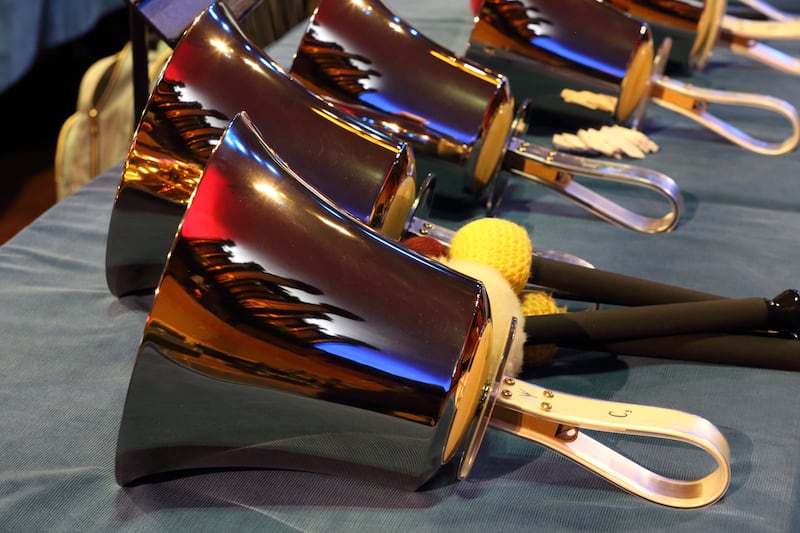
34:24
Sarah Jane Weaver: Well, so what are you going to do on Wednesday nights after you retire?
LeAnna Willmore: Well, maybe I’ll play the piano. Who knows? I have never wanted for anything to do, and I think that’s because I’m a musician. There’s always someone knocking at my door to help them with a solo or inviting me to teach something. And we’ll see. I think I’ll be just fine.
34:54
Sarah Jane Weaver: I have, over the years of my career, had some musicians express to me that sometimes they feel underappreciated in their wards or that people don’t pay enough attention to music. How does music lift and strengthen every worship experience?
35:13
LeAnna Willmore: Can you imagine Sunday without the organ playing? Without the hymns? I don’t feel underappreciated. I feel like my whole ward appreciates me. People come up and say, “Thank you for being here. Thank you for playing the organ.” I have not had that experience. I was not one of those people that felt like a second person accompanying; I always felt valued. So, some of it is your own ego, your own perspective that you come from, but when you realize what you’re contributing to that ward — and I work with the ward choir, I love them, and they just come and sing and do the very best they can for me — I just feel so appreciated and feel like our ward would not be the same without the music that we make.
36:15
Sarah Jane Weaver: Well, that is a perfect place to wrap things up. We have a tradition at the Church News podcast, where we like to give our guests the last word, and we try and have them answer the same question, and that question is: What do you know now? And so, LeAnna, what do you know now, after so many years of working with the Bells at Temple Square?
36:40
LeAnna Willmore: I know that I’m not alone in this. I figured out really soon that I wasn’t choosing that music alone and I was not coming prepared for the rehearsals alone. Even the things that I say in the rehearsal, that I have been planning, sometimes something else comes out of my mouth, me not knowing of the person that needs to hear that. That has come from something higher, from something divine. And I got to be the recipient of that. And I feel like I’ve really grown in that.
The other thing is I had no idea of the vastness of the Tabernacle Choir organization. And we’re part of it. I feel so happy to have been part of that and to have worked with Mack Wilberg, who’s a genius and a kind and loving friend. So, I’ve grown and had that wonderful opportunity.
37:57
Sarah Jane Weaver: You have been listening to the Church News podcast. I’m your host, Church News executive editor Sarah Jane Weaver. I hope you have learned something today about The Church of Jesus Christ of Latter-day Saints by peering with me through the Church News window. Please remember to subscribe, rate and review this podcast so it can be accessible to more people. And if you enjoyed the messages we shared today, please make sure you share the podcast with others. Thanks to our guests; my producer, KellieAnn Halvorsen; and others who make this podcast possible. Join us every week for a new episode. Find us on your favorite podcasting channels or with other news and updates on the Church on TheChurchNews.com.


